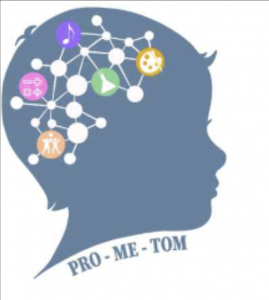

Pro-Me-ToM – An Erasmus+ Project
Promoting The Development Of Teachers’ And Students’ Metacognitive And Theory Of Mind Skills
Promoting The Development Of Teachers’ And Students’ Metacognitive And Theory Of Mind Skills’ is a project which will take place for the time span 1/9/2022 – 31/08/2024 in Cyprus, Greece, Romania, Hungary and Portugal, involving eight partner organizations.
The aim of the Pro-Me-ToM project is to raise educators and students’ awareness of the value of metacognitive abilities and further develop and promote students’ metacognitive abilities at both educational levels (primary & high school) through the corresponding training of teachers.
The Pro-Me-ToM project will provide a well-elaborated and tested developmental program for improving metacognitive awareness, a crucial skill for a meaningful participation in the information society.
Tests and description of in-class activities translated to five languages (English, Greek, Hungarian, Romanian and Portuguese) will be available for use to teachers form primary and secondary education in order to improve student’s metacognitive aware thinking.
The project is funded by the Erasmus+ programme of the European Comission
The anticipated impact for target groups (teachers and students)
Students:
The project is expected to:
(a) promote students’ metacognitive awareness about the process of learning and the construction of knowledge, their personal academic strengths and weaknesses and the demands of various tasks and achievement situations;
(b) enhance students’ metacognitive skills as regards planning, monitoring and regulating their own learning and problem solving activities. Within the classroom, students’ improved metacognitive skills are expected, in turn, to enhance self-regulation of their learning process as well as their learning outcomes.
(c) Students are expected to develop their strategic thinking via the development of their declarative, procedural and conditional knowledge base about the “what” strategies, “how” to apply them, “why”, and “when” to use different learning and thinking strategies appropriately and flexibly.
(d) The project is also expected to develop students’ ability to understand other people’s mental states as well as their own.
This improved ability is expected to boost students’ social interactions and their capacity to successfully function in their social environments.
Teachers:
The project will help teachers to:
(a) become more aware of their epistemological beliefs about the process of learning and the construction of knowledge;
(b) become aware of their own and their students’ metacognitive and theory of mind skills and the importance of these skills for students’ learning and social adaptation.
Within the classroom, teachers’ enhanced awareness is expected to have a positive impact on the ways they teach students to reflect on:
(a) how they think and learn and
(b) the causal role of mental states in initiating, guiding and controlling action.
Finally, in collaboration with the Educational Departments of our Universities and where possible with the Pedagogical Institutes we will integrate the design and the training program in the development of trainning programs for educators and students (as this will add extra value to the project’s aims and reslts).
- European University of Cyprus (Coordinator)
- University of Ioannina.
- Aristotle University of Thessaloniki
- University of Cyprus.
- University of UCLan Cyprus.
- Universidade de Coimbra.
- University of Pécs
- Sapientia – Hungarian University of Transylvania
Pro-Me-ToM – An Erasmus+ Project
